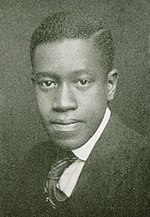Elbert Frank Cox
Elbert Frank Cox (born December 5, 1895 in Evansville (Indiana) , † November 28, 1969 in Washington, DC ) was an American mathematician and university professor . In 1925, he became the first African American in the world to receive his PhD in mathematics from Cornell University and was the first African American to be admitted to the American Mathematical Society (AMS).
life and work
Born to Eugenia Cox and Headmaster John Cox, Cox studied at Indiana University in 1913 after graduating from Clark High School . After serving in the US Army in France during World War I , he taught mathematics at public schools in Henderson, Kentucky and later at Shaw University in Raleigh, North Carolina . In 1922 he began studying mathematics at Cornell University to do his doctorate with William Lloyd Garrison Williams . In 1924 Williams moved to the Mathematics Institute at McGill University in Montreal , Canada and arranged an Erastus Brooks Fellowship for Cox so that he could do research with him at McGill University. There was a lot of racial tension in the United States at the time, such as the era of considerable activity by the Ku Klux Klan in which 31 African Americans were lynched in 1926. In 1925, Cox received his doctorate from Cornell University with the dissertation: The Polynomial Solutions of the Difference Equation aF (x + 1) + bF (x) = Phi (x). Williams believed that the dissertation had to be recognized by a university outside of the United States, as it was the world's first doctorate in mathematics by an African American. Universities in England and Germany rejected it, but the Tōhoku Imperial University in Sendai , Japan accepted it. In September 1925, Cox accepted a position as a professor at West Virginia State College . In those days, many black scientists moved to Howard University. In 1929, Cox also moved to Howard University, where he was chairman of the mathematics department from 1957 to 1961 and taught until his retirement in 1965. In 1975, Howard University established the Elbert F Cox Scholarship Fund to help black students enter mathematics. The National Association of Mathematicians honored Cox in 1980 by establishing the annual Cox-Talbot address. Cox had been married since 1927 to Beulah Kaufman, the elementary school teacher and daughter of a former slave, whom he had met at his brother's church, the Bethel African Methodist Episcopal Church in Princeton .
Cox published only two articles during his lifetime, one of which was his PhD. This was not uncommon for mathematicians of the day, when there was less emphasis on research and publication than it is today. As an American Mathematical Monthly article notes, African American scholars of the period did not have the opportunity to do research at research universities. The heavy workload and lack of financial support in the historically black colleges made it nearly impossible to conduct research programs of any kind and produce publications necessary to gain an academic reputation. Cox let his membership in the AMS expire in 1925 and renewed it only in 1948. He was, however, a member of Beta Kappa Chi, a black, scientific fraternity, which enabled him to maintain contact with the scientific community. Although the scientific societies had African-American members, it was difficult and uncomfortable for these members to attend meetings, especially since they were often not allowed to attend social events or stay in the hotels and convention centers where the meetings were held.
literature
- LC Bruno: Elbert Frank Cox, in EJ McMurray (ed.), Notable Twentieth Century Scientists, 1995, 418-419.
- CW Carey Jr: Elbert Frank Cox, American National Biography 5, Oxford, 1999, 621-622.
- JA Donaldson and RJ Fleming: Elbert F Cox an early pioneer, Amer. Math. Monthly 107 (2), 2000, 105-128.
- VK Newell: Black Mathematicians and their Works. Ardmore, PA: Dorrance, 1980.
- Krapp, Kristine M .: Notable Black American Scientists. Detroit: Gale Research, 1999, ISBN 978-0787627898 .
- Spangenburg, Ray; Moser, Kit: African Americans in Science, Math, and Invention. New York, NY: Facts on File, 2003, ISBN 0-8160-4806-1 .
- Talitha M. Washington: Evansville Honors the First Black Ph.D. in Mathematics and His Family, Notices Amer. Math. Soc. 55 (5), 2008, 588-589.
Web links
- Elbert Frank Cox in the Mathematics Genealogy Project (English)
- John J. O'Connor, Edmund F. Robertson : Elbert Frank Cox. In: MacTutor History of Mathematics archive .
- Biography at MAA
- biography
- Math department honors CU pioneer Elbert Cox, first black math Ph.D.
| personal data | |
|---|---|
| SURNAME | Cox, Elbert Frank |
| BRIEF DESCRIPTION | American mathematician and university professor |
| DATE OF BIRTH | December 5, 1895 |
| PLACE OF BIRTH | Evansville, Indiana |
| DATE OF DEATH | November 28, 1969 |
| Place of death | Washington, DC |
